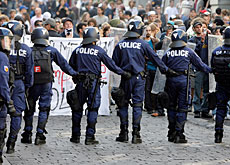Army and foreign police to aid Euro 08 security

Switzerland has drafted in security substitutes, in the shape of the army and foreign police, to help tackle security at the European Championships next year.
Reinforcements are necessary as the country has a relatively low police count of around one officer for every 500 citizens. But organisers insist the tournament will be a “feast, not a fortress”.
Speaking at a conference in Zurich on Thursday, Swiss security chief Martin Jäggi was at pains to emphasise that the army will operate at arm’s length from the public and only provide backup to police.
“The army will have an important role but it will be limited to certain key objectives, such as protecting electricity supply in the event of a catastrophe,” Jäggi told swissinfo. “They could also provide air transport to draft in police from various cantons and logistical support.”
Some 15,000 troops have been made available to hosts Zurich, Basel, Bern and Geneva during the tournament, but the last has decided it does not need such support.
Between 500 and 1,000 police officers from France and Germany will also be on hand to strengthen law and order during games. In addition, hooligan spotters will be on hand along with fan liaison officers to help conquer language barriers.
Host countries Switzerland and Austria have combined with neighbouring countries, participating nations and the European central police agency Europol to make sure they have all bases covered.
Switzerland, like Austria, has also introduced tough new laws banning known troublemakers from travelling to the tournament or attending matches and has set up a hooligan database.
Risk categories
The 16 countries that will compete in the finals have been graded according to their potential security risk. Croatia, Germany and Poland have been categorised as high risk, but all three play their group games in Austria.
Spain are rated as low risk and the other countries moderate. Among those middle countries, Turkish fans have been flagged up as presenting a higher risk for violence while the Swiss are deemed more likely to drink too much than the fans of most countries.
But Jäggi does not think there is a particularly high chance of hooliganism in Switzerland during the tournament, and is even disappointed that England did not qualify.
“We had a lot of luck with the matches [during the group stage draw earlier this month]. We have interesting matches and teams from neighbouring countries who will bring a lot of fans with them,” he told swissinfo.
“This presents challenges, but there is not a very high risk of hooliganism at the matches. It is a shame that England did not qualify because their fans are very passionate – 99 per cent of them want to watch the football and not cause trouble.”
The final security details are still being thrashed out between the hosts and participating countries. In February, Switzerland will receive a report from Dutch behavioural scientist Professor Otto Adang, who recently visited the Swiss host cities to evaluate their security measures.
swissinfo, Matthew Allen in Zurich
Up to 5.4 million people are expected to travel to watch games at the four main stadiums and on big screens in Switzerland during the three-week tournament.
The security operation is expected to cost SFr64 million ($56 million), of which SFr28 million will be paid by the cantons.
During matches, 50 spotters will be deployed in Basel to keep an eye out for potential trouble, 35 in Zurich, 26 in Bern, 21 in Geneva.
Bern will host the Police Information and Coordination Centre (PICC), the nerve centre of security operations for both Switzerland and Austria during the tournament.
Co-hosts Switzerland and Austria qualified automatically for the tournament, which takes place from June 7-29, 2008.
The 31 games will be played in four cities in Switzerland (Basel, Bern, Geneva and Zurich) and four cities in Austria (Innsbruck, Klagenfurt, Salzburg and Vienna). The final will be held in Vienna on June 29.
Switzerland will play their three qualifying matches in Basel.
Eight title winners took part in Sunday’s draw, with Denmark the only previous champions not to have qualified. England are the other notable absentees.
Poland and Austria are the only two countries taking part in the tournament for the first time.


In compliance with the JTI standards
More: SWI swissinfo.ch certified by the Journalism Trust Initiative












You can find an overview of ongoing debates with our journalists here . Please join us!
If you want to start a conversation about a topic raised in this article or want to report factual errors, email us at english@swissinfo.ch.